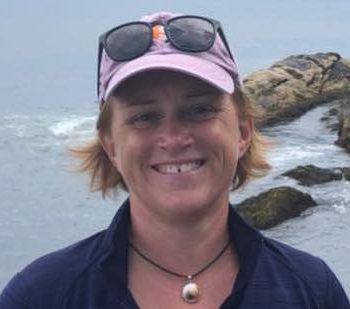
Career
- Current position: Director, Schiller Coastal Studies Center at Bowdoin College.
- Position during PhD studies: Assistant Provost for Strategic Initiatives & Associate Director, UNE North, University of New England
In an education career that has spanned almost 25 years and the secondary school, higher education, corporate, and non-profit environments, Holly has consistently sought to create accessible pathways for all learners so that they might identify their passions and activate their strengths. Her passion for understanding how education can and must play a role in developing a sustainability literate and engaged citizenry is powered by her time spent in the maritime industry and a lifetime on, in and near the ocean. Holly has worked in traditional, experiential and digital classroom settings. She has collaborated with school systems in Alaska and the USVI to develop standards-aligned, interdisciplinary digital curricula, taught high school English for 14 years in boarding school settings, and directed a boat building program for at-risk youth in Maine before arriving at UNE in 2015. Her leadership of UNE North, which was grounded in the UN Sustainable Development Goals, connected researchers, educators, policymakers, and industry leaders from across Maine and the North Atlantic region to implement collaborative education and research approaches to building resilient communities, healthy environments, and thriving economies. In July 2022, Holly was named director of the Schiller Coastal Studies Center at Bowdoin College. In addition to her oversight of this marine science field station, Holly is growing the Center’s programs to include the local community, regional and global partners in interdisciplinary approaches to sustainable development.
Dissertation
Title: Leadership of Heart and Mind: Examining the Mind and Skill Sets of Student Sustainability Leadership
Abstract: The purpose of this comparative case study was to deepen the understanding of post-secondary student sustainability leaders’ motivations and identify the skills they have employed in order to inform the development of curricular and co-curricular sustainability leadership learning experiences. The study sought to answer three central research questions: What motivates students to become sustainability leaders in higher education settings? How do student sustainability leaders describe their role and effectiveness as leaders and in collaboration with or comparison to university personnel responsible for moving the institution’s goals of sustainability forward? What leadership qualities and skills have student sustainability leaders used to transform complex higher education cultures? This study identified five potential participants currently engaged or engaged within the last three years in significant sustainability leadership initiatives in higher education. Three-part interviews were central to the study. Transcripts were coded in three stages: mindset, derived from the contrasting mindsets suggested by Schein (2015); skill set, derived from the sustainability leadership skills suggested by Tideman and Zandee (2013), Metcalfand Benn (2013), and Bendell and Little (2015); and open. Cross case analysis was used to identify themes consistent across participants. The five participants demonstrated a motivation to model, inspire and facilitate decision making that recognizes the interdependence and interconnectivity of human and nonhuman systems; expressed a personal or spiritual connection to nature; and spoke of their desire to benefit present and future systems. Participants demonstrated a shared skill set consistent with that suggested by Tideman and Zandee (2013 ), Metcalf and Benn (2013 ), and Bendell and Little (2015). These findings suggest that providing experiential, problem-based learning as well as peer and supervisory mentoring as part of sustainability education is ofhigh value and that the shared skill set can be used to build learning outcomes, experiences and assessments. This study also suggests that higher education institutions reexamine their priorities, policies and practices across the entirety of their systems in order to ensure that sustainability is part of the fabric of their culture and model sustainability as a priority that cuts across disciplines and silos.

